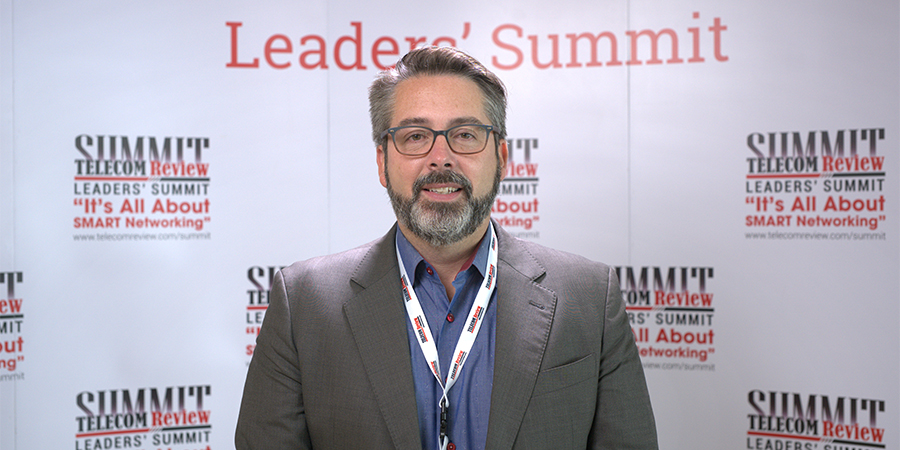During the 15th Telecom Review Leaders’ Summit held at the InterContinental Dubai Festival City, Telecom Review welcomed Ricky Boyle, SVP, transformation solutions, B-Yond, in person. In an exclusive interview, Boyle shared the key transformation solutions that B-Yond offers in today’s open, inclusive, and global ecosystem as well as his outlook on how important it is for telcos to accelerate development amid hyperscalers and other ICT players.
You were one of the panelists on this year’s agenda. Can you share briefly about the topic of network infrastructure evolution?
B-Yond is here with the rest of the panel in exploring the impact of the pandemic on networks in general, specifically on bandwidth, on doing more with less, and managing network demand.
The demand has been increasing year-over-year. Hence, we tackled what's the impact of the pandemic on this and how has it changed the nature of the network and furthermore, how can machine learning be used and applied to really benefit and impact how users experience the network.
As one of the fastest-growing AI companies and leaders in network intelligence and automation, why are you focusing on telecom? Who are your current partners?
We're focusing on telecom for many reasons, one of which is that it's a terribly exciting industry. It's continuously innovating, and in the heart of innovation is where our passion is. Moreover, when you look at the demand for technology in telecom, it continues to grow year-on-year, in leaps and bounds.
The pandemic has only increased the demand for telecom and it proved that telecommunications is at the heart of how people connect. Hence, it's a very exciting place to be. All that being said, this is our pedigree, this is where we grew up. We are network engineers, this is what we have doing since we got into this industry.
We understand how this works, and we still see large gaps in the way automation, by design, is applied in the telecom. It’s at the heart of what is needed by the consumers, requiring skill sets and deployment for underserved markets, and that's our sweet spot.
What are the key transformation solutions that B-Yond offers in today’s open, inclusive, and global ecosystem?
In terms of what are the typical use cases we're seeing in the industry, primarily we're talking about two major factors regarding applying ML into automation by design: continuous assurance and continuous validation. In our view, we need to do several things in terms of how we operate networks. We need to drive inefficiencies by enabling automation. We need to be able to shorten the life cycle of introducing change in the network operations, in particular when it comes to introducing new products and new capabilities.
This is where continuous validation comes in, with pre-production networks driving higher volumes of testing. There are many more components since we are in a complex world. We need to drive additional layers of testing and automation so that we can have a full lifecycle for these tests to understand if there are any challenges with new components or changes onto the network state. In this way, we can understand what those challenges are and fix them before they go into the production network.
Then, we need to shorten the life cycle from pre-production into post-production or production networks. And that's where we bring in continuous assurance, which is really about understanding the current state of the network at any point in time, knowing that it is operating at the right level for the best quality of service to its consumers. Moreover, if there is any issue, we will solve the root of the problem. This approach brings us closer as an industry to true zero-touch network automation.
Advocating agile as an approach for businesses, how important is it for telcos to accelerate development amid hyperscalers and other ICT players?
In terms of the need for agility in the telco industry, I am certain that numerous telcos have already agile operations. What we're focused on now is the move to network DevOps. This is the next evolution for telecommunications.
I would argue that both of these elements — agility and net DevOps — are critical to the success of telcos in the next evolution of their network life cycle, in particular to the context of hyperscalers.
When we look at the way telcos are traditionally operated, it’s really about ensuring zero failure, talking about five nines where everything is always up and running. Whereas a hyperscalers kind of mindset is designed for failure. Indeed, it is a different mindset that seems unintuitive perhaps, but, in the end, gives much better results.
We need to change the mindset of how we manage our networks. We need to design them to fail. We need to even throw chaos in to create failures and see how the network operates. As such, we need much faster systems, whether it’s people, processes, or technology, in order to understand what changes can be made to drive that resiliency and then implement them.
In short, agility and net DevOps, as an extension, are critical to the success of telcos’ moving forward.
